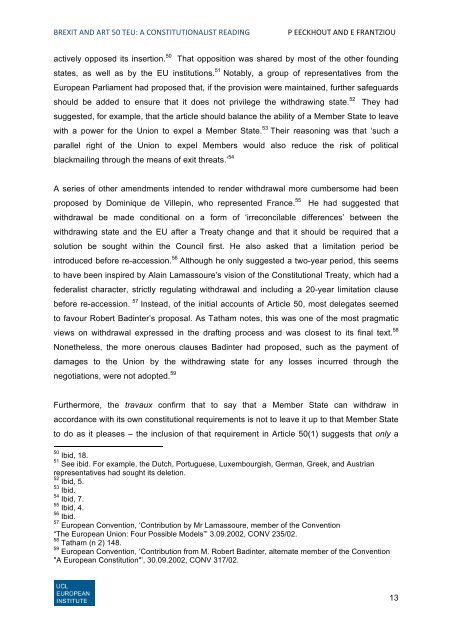brexit-article-50
brexit-article-50
brexit-article-50
Create successful ePaper yourself
Turn your PDF publications into a flip-book with our unique Google optimized e-Paper software.
BREXIT'AND'ART'<strong>50</strong>'TEU:'A'CONSTITUTIONALIST'READING''''''''''''''''''''P'EECKHOUT'AND'E'FRANTZIOU'<br />
actively opposed its insertion. <strong>50</strong> That opposition was shared by most of the other founding<br />
states, as well as by the EU institutions. 51 Notably, a group of representatives from the<br />
European Parliament had proposed that, if the provision were maintained, further safeguards<br />
should be added to ensure that it does not privilege the withdrawing state. 52 They had<br />
suggested, for example, that the <strong>article</strong> should balance the ability of a Member State to leave<br />
with a power for the Union to expel a Member State. 53 Their reasoning was that ‘such a<br />
parallel right of the Union to expel Members would also reduce the risk of political<br />
blackmailing through the means of exit threats.’ 54<br />
A series of other amendments intended to render withdrawal more cumbersome had been<br />
proposed by Dominique de Villepin, who represented France. 55 He had suggested that<br />
withdrawal be made conditional on a form of ‘irreconcilable differences’ between the<br />
withdrawing state and the EU after a Treaty change and that it should be required that a<br />
solution be sought within the Council first. He also asked that a limitation period be<br />
introduced before re-accession. 56 Although he only suggested a two-year period, this seems<br />
to have been inspired by Alain Lamassoure’s vision of the Constitutional Treaty, which had a<br />
federalist character, strictly regulating withdrawal and including a 20-year limitation clause<br />
before re-accession. 57 Instead, of the initial accounts of Article <strong>50</strong>, most delegates seemed<br />
to favour Robert Badinter’s proposal. As Tatham notes, this was one of the most pragmatic<br />
views on withdrawal expressed in the drafting process and was closest to its final text. 58<br />
Nonetheless, the more onerous clauses Badinter had proposed, such as the payment of<br />
damages to the Union by the withdrawing state for any losses incurred through the<br />
negotiations, were not adopted. 59<br />
Furthermore, the travaux confirm that to say that a Member State can withdraw in<br />
accordance with its own constitutional requirements is not to leave it up to that Member State<br />
to do as it pleases – the inclusion of that requirement in Article <strong>50</strong>(1) suggests that only a<br />
<strong>50</strong> Ibid, 18.<br />
51 See ibid. For example, the Dutch, Portuguese, Luxembourgish, German, Greek, and Austrian<br />
representatives had sought its deletion.<br />
52 Ibid, 5.<br />
53 Ibid.<br />
54 Ibid, 7.<br />
55 Ibid, 4.<br />
56 Ibid.<br />
57 European Convention, ‘Contribution by Mr Lamassoure, member of the Convention<br />
“The European Union: Four Possible Models”’ 3.09.2002, CONV 235/02.<br />
58 Tatham (n 2) 148.<br />
59 European Convention, ‘Contribution from M. Robert Badinter, alternate member of the Convention<br />
"A European Constitution"’, 30.09.2002, CONV 317/02.<br />
13


